CES 2013: Intelligent cutlery and other smart phone innovations
- Published
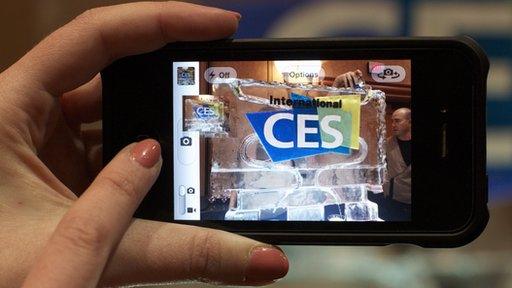
Gadget and software makers are taking advantage of the boom in smartphone sales
Every year the Consumer Electronics Show (CES) in Las Vegas offers new tech to chew over - but never before quite like this.
A French company is here pitching the world's first smart fork.
Described as "intelligent cutlery" the device features a sensor which detects the loop made when you pick up food, put it in your mouth, and then return the fork to your plate.
If it discovers you have carried out the action too quickly it buzzes in your hand to tell you to slow down. After meals it also uploads data to a smartphone app to help you keep track of your eating habits.
Its inventor says he came up with the idea after his wife complained he wolfed down her cooking.
Smart cutlery monitors intake
"I knew that I was eating too quickly and I had to modify my habits," recalls Hapifork's Jacques Lepine.
"Although I tried to eat slowly, I'd quickly start thinking about something else - I couldn't control myself."
The resulting product took seven years to develop and will be marketed as a means to tackle weight gain and digestive problems.
It proved one of the wackiest devices at CES Unveiled - a teaser event before Tuesday's trade show begins.
But it also points to two of this year's key trends: the rise of heath and fitness-focused products - the category is taking up 25% more floor space than last year - and what organisers term the "appification" of the tech world. By this they mean it is becoming the norm for gadgets to collect data and send it to software run by smartphones, tablets and PCs rather than feature self-contained read-out screens.
Throwaway tech
Another example at the event was Bodymedia's latest device - an adhesive patch that is stuck onto your arm for seven days.
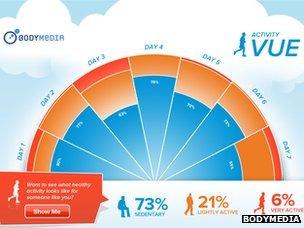
Bodymedia's adhesive activity monitor is designed to be disposed of after use
After the period is up you tear it open, plug a contained device into a USB port, download the collected data and dispose of the equipment.
You can then view information about how active you were, your calorie burn and your sleeping habits over the period, as well as suggestions for how you could improve your lifestyle.
The firm plans to sell the device for under $50 (£32) - something that has become possible because the cost of its parts has tumbled.
"Accelerometer prices and the cost of all the other sensors inside have gone down from where they were 10 years ago," explains spokeswoman Gwen Smith.
"So it may appeal if you're not ready to commit to one of our more expensive products and want to understand what kind of data you are going to get, but it could also be that you may have just been released from hospital and they want to monitor how you're doing in that first week out."
Lost luggage
Los Angeles-based GlobaTrac is using sensors to solve another problem: lost luggage.
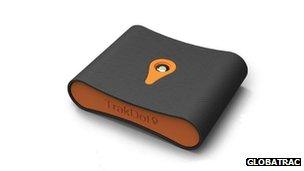
Trakdot's makers say millions of bags go missing every year at airports
Its forthcoming Trakdot is a small plastic-covered device you slip inside your bag which communicates with your phone via Bluetooth to tell you which airport it is at and, assuming you are at the same one, how far away it is.
The equipment is designed to comply with air travel regulations by switching itself off when in flight.
"Imagine I'm going on holiday, I put this in my bag, and when I get to New York I turn my phone on and I discover it's still in London," says the firm's Jagdeep Bhaura.
"Rather than stand there for an hour wasting my holiday I go to the airline and tell them to sort it out."
Connect and control
The proliferation of connected devices risks causing its own frustrations.
Users could become tired of having to keep switching from app to app to check where their keys are, adjust their wi-fi connected lights, alter the volume of their music, close the garage door and other repeated tasks if smart devices become the control hubs suggested.
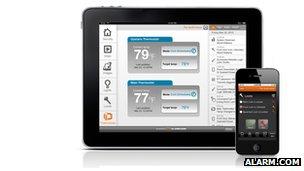
Alarm.com uses cellular-based connections to avoid the risk of a home's broadband internet going offline
Alarm.com is attempting to address this problem within the "connected home" - another of this year's big themes.
It is developing smartphone software for a variety of third-party devices, allowing users to boost their home's temperature, unlock their front door and check in on security devices, among other tasks, from a single interface.
"We have a lot of rules that you can set up to let these things happen automatically," adds Alison Slavin, one of the company's co-founders.
"So I could say 10 minutes before sunset that I want my porch lights to automatically come on.
"We also have services which are location-based, so when I drive away from my house my security system should arm, my thermostat change its setting, my lights turn off and my doors lock."
Android oven
Further evidence that tech companies have their eye on domestic chores was seen in what is claimed to be the world's first Android-powered oven.
Dacor's cooker features a built-in 7in (18cm) display which can bring up recipes and then adjust the heat and cooking times to ensure best results.
What's more you can set it to start cooking at a certain time - and then send a message from your smartphone to delay it turning itself on if you get stuck at work.
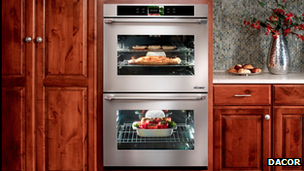
The Discovery IQ oven's Android touchscreen can adjust cooking times for the size of dish cooked
New spins on more traditional tech were also on display - including LG's latest ultra-high definition TV and a "rip and flip" laptop from Lenovo which allows its screen to be detached from its keyboard, turned round and then reattached to let the base act as a stand.
But the event's organisers themselves acknowledge that growth in the consumer tech market is now a "two-horse race": tablets and smartphones. New data from research agency Gfk suggests both will see global sales rise by more than 20% in dollar terms this year, far outpacing other categories.
As a result it's little surprise these are the machines many device and software makers are trying to ride to success.
- Published8 March 2012